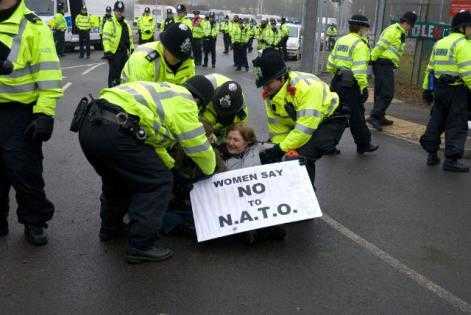Gender and Militarism
15 May – International Day on Conscientious Objection with a focus on Women Conscientious Objectors
Women and conscientious objection is the theme War Resisters' International chose for 15 May 2010 – International Day on Conscientious Objection. To coincide with International CO Day, WRI also publishes an important new book on the issue: Women Conscientious Objectors – An Anthology (see more on page 8). As Howard Clark writes in his preface: "In several senses, an anthology such as this is long overdue. First in the sense of acknowledging this part of the relatively hidden history of antimilitarism. Second for War Resisters' International organisationally. Founded in 1921, WRI has for much of its history been male-dominated, despite the prominent role of women in various affiliates and with certain exceptions at the international level such as long-serving WRI General Secretary Grace Beaton. Since 1972 conscious efforts have been made to change this — first the introduction of inclusive language (s/he, etc), and then, beginning in 1976, the organisation of special women's gatherings, usually in conjunction with WRI's “elder sister” the International Fellowship of Reconciliation. The second gathering in Scotland served as a prelude to the resurgence of an international women's peace movement in the 1980s, and produced a forceful statement on Women as Total Resisters. The British women involved in these gatherings formed the Feminism and Nonviolence Study Group and WRI later co-published their book Piecing It Together (now online at http://wri-irg.org/pubs/Feminism_and_Nonviolence). Then in 1986 the WRI Women's Working Group was formed to take this work forward and to provide a welcoming entry point for women activists, while WRI's 1987 seminar on Refusing War Preparations: Non-cooperation and Conscientious Objection was a response to feminist prompting to look at 'the wider implications of conscientious objection'. That seminar reflected new interest in the Anti-War Plan presented to WRI in 1934 by Bart de Ligt, but it took a decidedly more feminist approach. Activities central to war refusal — war tax resistance, refusing war work and opposing cultural preparations for war — are all areas where women have been and remain at the forefront."
With this publication, and a focus on women and conscientious objection for 15 May 2010, War Resisters' International stresses its understanding "that to omit gender from any explanation how militarisation occurs, is not only to risk a flawed political analysis; it is to risk, too, a perpetually unsuccessful campaign to roll back that militarisation" (Cynthia Enloe). Consequently, agendered perspective on war and militarism – and on antimilitarism – is at the core of WRI's work in support of conscientious objectors, and to remove all causes of war.

Add new comment